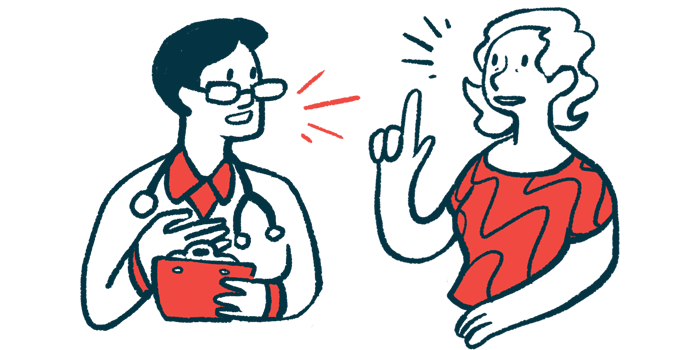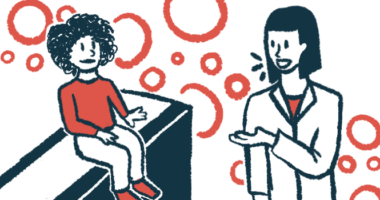Communication is among top concerns in Rett caregivers survey
Other patient concerns: Seizures, walking or balancing problems, hand function

Effective communication is a top concern for people affected by Rett syndrome or related disorders, a U.S. caregiver survey has found.
Other top concerns for patients include seizures, problems with walking or balancing, loss of function in the hands, and constipation.
Recent progress in understanding brain development disorders such as Rett syndrome has opened avenues to potential treatments. Now, these treatments need to be tested in clinical trials.
Therefore, understanding what matters to patients and their caregivers is important for treatment development and for choosing meaningful ways to measure success in clinical trials, researchers note.
The study, “Top caregiver concerns in Rett syndrome and related disorders: data from the US natural history study,” was published in the Journal of Neurodevelopmental Disorders.
In line with the U.S. Food and Drug Administration’s mission of building bridges by involving the community in decision-making, researchers in the U.S. surveyed caregivers for their views on what they believe matters most to Rett patients.
The researchers drew on data from the Natural History of Rett Syndrome and Related Disorders (NCT02738281), a study that tracked the natural course of Rett syndrome from 2006 to 2021 to gain new insights into the disease and raise the clinical standards of care.
925 caregivers asked for their top 3 concerns for patients under their care
At each visit from 2014 to 2021, a total of 925 caregivers were asked to select their top three concerns for the patient under their care. Most patients (88.1%) were female and nearly two-thirds (65.6%) were 15 years or younger.
The most common diagnosis was classic Rett syndrome in 641 patients, followed by atypical Rett syndrome in 84 patients. Classic Rett syndrome is caused by mutations in the MECP2 gene; atypical forms are defined by characteristic symptoms, age at onset, and genetic makeup.
Other diagnoses included MECP2 duplication syndrome (MDS), CDKL5 deficiency disorder (CDD), and FOXG1 syndrome. These disorders are said to be related to Rett syndrome “due to observed clinical similarities,” the researchers wrote.
The top concerns reported by caregivers of people with classic Rett syndrome were effective communication, seizures, problems with walking or balancing, loss of function in the hands, and constipation.
Analysis of the top caregiver concerns in people with [Rett syndrome] and Rett-related disorders from a large natural history study provided important information relevant to the design and selection of clinical outcome measures.
Caregiver concerns align with known clinical problems
These “concerns likely represent the most relevant concerns in classic [Rett syndrome] … and align well with known clinical problems,” the researchers wrote.
Effective communication remained the top concern for caregivers of patients across all age groups except those older than 40 years, who had more frequent concerns about the loss of their walking or balancing ability.
“This is not surprising as communication is fundamental to interpersonal connections and the loss of both hand skills and spoken language profoundly impairs … [the] ability to effectively communicate,” the researchers wrote.
Whereas caregivers of patients with more severe seizures reported heightened concerns about the risk of seizures, those of patients without active seizures often top-ranked effective communication and loss of hand function.
Similar observations were made for patients scoring higher on the Clinical Global Impression–Severity and Clinical Severity Score, where higher scores mean more severe impairment.
The top five concerns were the same, regardless of the disease-causing MECP2 mutation. However, concerns about repetitive hand movements, screaming, or scoliosis dropped for patients carrying the R924X mutation.
Swallowing air was less of a concern for patients carrying the R270X or CTT mutations. In contrast, concerns about behavioral problems such as anxiety and self-abuse were reported more frequently by caregivers of patients with the R133C, R294X, or R306C mutation.
Same top concerns reported for classic Rett syndrome and atypical forms
The top concerns reported were about the same for classic Rett syndrome and for the atypical forms. However, those caring for people with severe atypical Rett syndrome more frequently reported concerns about seizures, abnormal movements, and gastrointestinal (digestive) issues.
While effective communication remained the top concern for caregivers of people with MDS or FOXG1 syndrome, seizures were the most common concern for those with CDD. “This reiterates the known increase in overall seizure burden in people with CDD,” the researchers wrote.
When caregivers were asked whether they felt the patient under their care had improved and why, the top reason for improvement was effective communication and for worsening, it was seizures.
“Analysis of the top caregiver concerns in people with [Rett syndrome] and Rett-related disorders from a large natural history study provided important information relevant to the design and selection of clinical outcome measures,” the researchers concluded.
Among their study’s limitations, the researchers said the data came mostly from “White, non-Hispanic participants, who are relatively highly educated caregivers and from households with higher annual income, limiting the ability to generalize the findings to other demographic groups.”








